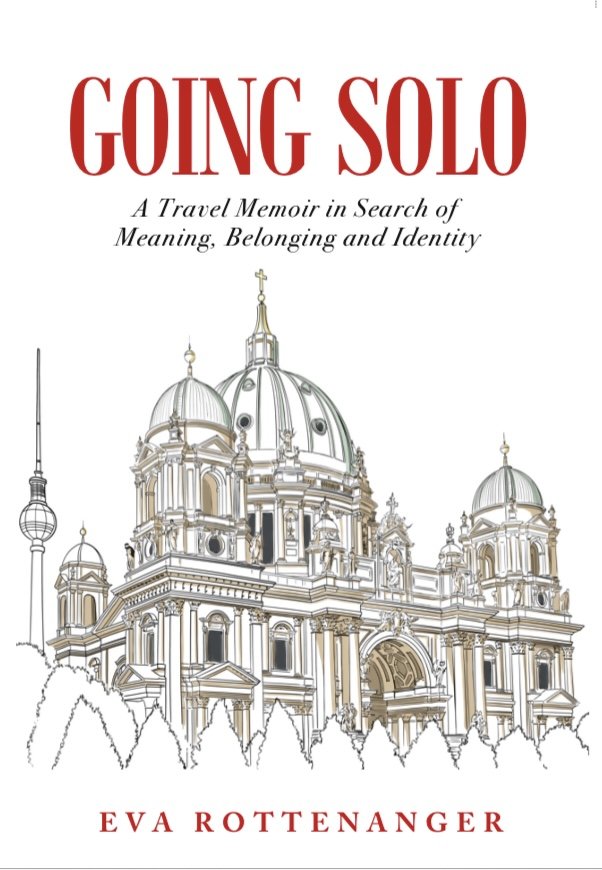
An evocative armchair ride around the globe that inspires travel, especially for readers in transition, as a way of resetting life.
By including insightful reflections on the immigrant experience, history and ex-pat living, the author shows how contact with unfamiliar environments can sharpen our views on society, politics and spirituality and so help define our identity. By bringing questions of meaning and belonging into focus, travelling often invites us to re-evaluate our inner landscape, old beliefs and priorities. Every journey has the potential to lead us toward a truer version of ourselves and show us how we fit into history and the global landscape. The daily realities of going solo as a senior combine with reflections on living and working abroad to highlight the vital role travel can play in the perpetual work in progress of learning who we are. Travellers, she found, share traits such as openness to new ideas, curiosity, tolerance, and compassion – she aims to belong to that tribe. Reflecting on John – a fellow passenger who’s still going solo aged ninety – the memoir concludes that it’s never too late to start exploring and rewriting the story of who we are.
Travel Blog
Going Solo: Reviews from experienced travellers & expatriates
“…provides both the inspiration and practical advice to simply take the leap and go.” P Carmody
“…engrossing and compelling while offering intriguing, thought-provoking insights…” G Phillips
“Most poignant was the author’s quest to understand herself, her origins and her place in the world…” J Scott
“…an excellent travel companion, especially for those new to solo travel, that led me to reflect on the web of contradictions that lie at the heart of any cultural engagement…” G Jones
“I found a soulmate in the author. Travelling for me is also a way to find my own meaning, belonging and identity. I felt myself walking beside her on the streets of London, Chicago and other cities.” K Ignasheva
Art Work
Going Solo: Synopsis
An evocative armchair ride around the globe that inspires travel, especially for readers in transition, as a way of resetting life.
By including insightful reflections on the immigrant experience, history and expat living, the author shows how contact with unfamiliar environments can sharpen our views on society, politics and spirituality and so help define our identity. By bringing questions of meaning and belonging into focus, travelling often invites us to re-evaluate our inner landscape, old beliefs and priorities. Every journey has the potential to lead us toward a truer version of ourselves and show us how we fit into history and the global landscape. The daily realities of going solo as a senior combine with reflections on living and working abroad to highlight the vital role travel can play in the perpetual work in progress of learning who we are. Travellers, she found, share traits such as openness to new ideas, curiosity, tolerance, and compassion – she aims to belong to that tribe. Reflecting on John – a fellow passenger who’s still going solo aged ninety – the memoir concludes that it’s never too late to start exploring and rewriting the story of who we are.
‘Observed commonality sparks a conversation with James, my neighbour on this flight to Bangkok. Solo travellers, I’ve noticed, tend to latch on to the familiar, whatever form that familiarity takes because we tend to search for the icebreaker that will allow us to connect. James and I are soon slicing into each other’s history like surgeons under time pressure. We discover that we’d both lived and worked in Shanghai teaching English. The superficial observations about enjoying similar music and films opens the door to discover that we’d also built romantic relationships with mainland Chinese citizens – his resulting in marriage – which had both shattered for many reasons. Still, the main one by far was the enormous cultural divide. The overarching dominance of family and the norms of behaviour within an ideology of the collective rather than our Western focus on the individual eventually saw the relationships collapse like bridges over an increasingly turbulent river.
‘The day my mother-in-law moved in with us was the beginning of the end. She ruled the house. I became an outsider in my own home,’ says James. ‘Eventually, I left.’
The depth of our conversation is utterly inconsistent with our status as strangers. However, finding a human connection and exchanging existential insights can be valuable and enduring, no matter how incidental and brief that experience is while exploring the world, each other, and ourselves. These are the gems of solo travel. Such harmony with another on issues close to the soul is like a melody that reassures us that we’re not alone in this world and can find true commonality far from familiar surroundings. James giving voice to how cultural issues eroded his relationship helped me better understand the failure of mine – I’d walked out too. As my understanding grew, the grip the memory had on my heart released, and I began the process of forgiving myself – an epiphany inspired by a stranger who I’ll probably never meet again – a gift. Perhaps this is the reason some of us travel the world. We seek not merely to discover the new and different in the external world – but to uncover our essential selves as reflected in the differences and, better still, the similarities we share with people we meet. The announcement that we’re about to land shakes me out of my reverie. We disembark and say farewell.’























